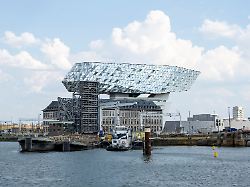Duisburg praises the port of Antwerp
“Flanders is the powerhouse for us in Belgium”
By Andrea Sellmann and Mary Abdelaziz-Ditzow
January 4, 2024, 9:38 a.m
Listen to article
This audio version was artificially generated. More info | Send feedback
The port of Antwerp is an important hub for the global economy – and partner of the Duisburg inland port. Together they want to survive the tough competition. The ports are also cooperating on the future topic of “green hydrogen”.
For many people, Brussels is the first place on their agenda when they think of Belgium. After all, the Belgian capital is omnipresent as an EU power center. And yet, alongside Flanders and Wallonia, it is only one of three regions that make up our neighboring country. While Wallonia had to struggle with the loss of coal and steel, Flanders has access to the North Sea and the port in Antwerp. For Markus Bangen, head of the Port of Duisburg, this region is clearly “the powerhouse for us in Belgium”. And that needs to be expanded.
For Bangen, a good partnership is the basis of the business relationship between the ports of Duisburg and Antwerp. “We both have our strengths and they complement each other very well,” he says in the “Wirtschaft Welt & Weit” podcast. Antwerp is looking towards the lake, Duisburg is looking towards supplying the Rhine-Ruhr conurbation.
When it comes to the future topic of green hydrogen, the ports are relying on cooperation: the transformation of the industry can only be achieved with the help of imports, explains port boss Bangen. Antwerp is one of the hotspots for the transshipment of hydrogen, and existing pipeline connections will also be used for this in the future.
Calm collaboration
Against the backdrop of global competition, both sides are “very aware that we are currently fighting for our location.” For Bangen, this can only be done together: The collaboration with the Port of Antwerp is calm and on an equal footing – true to the motto: “We’ll just do it and be happy if it’s successful.”
Is the “Belgian understatement” the reason why many Germans know so little about our direct neighbor? Sabine Schmitz from the Belgium Center at the University of Paderborn wants to change that and in the new podcast episode she brings us a little closer to the different regions, language communities and parliaments of the Belgians. And it reports further economic potential – for example in the semiconductor industry.
Different ways of dealing with Chinese investors
In this podcast episode, host Mary Abdelaziz-Ditzow discusses with Sabine Schmitz and Markus Bangen about Belgian peculiarities, common future opportunities and the different ways in which Chinese investors are dealt with in Germany and Belgium.
Markus Bangen is CEO of Duisport, Duisburger Hafen AG. He has forged many economic ties with our Belgian neighbors, especially with the port of Antwerp.
Sabine Schmitz is a professor at the University of Paderborn and chairwoman of the Belgium Center there. The aim of the institution is to bring Germany and Belgium closer together – in many different disciplines such as history, culture and of course economics.
What does Germany have to do to continue to play an important role in the economic world of tomorrow? Who do we depend on? Which countries benefit from the new world situation? Mary Abdelaziz-Ditzow discusses this with relevant experts in the ntv podcast “Wirtschaft Welt & Weit”.
You can find all episodes in the ntv app or wherever podcasts are available: at RTL+ music, Apple Podcasts, Google Podcasts, Spotify, Amazon Music or Deezer. For all other podcast apps you can use the RSS feed.
